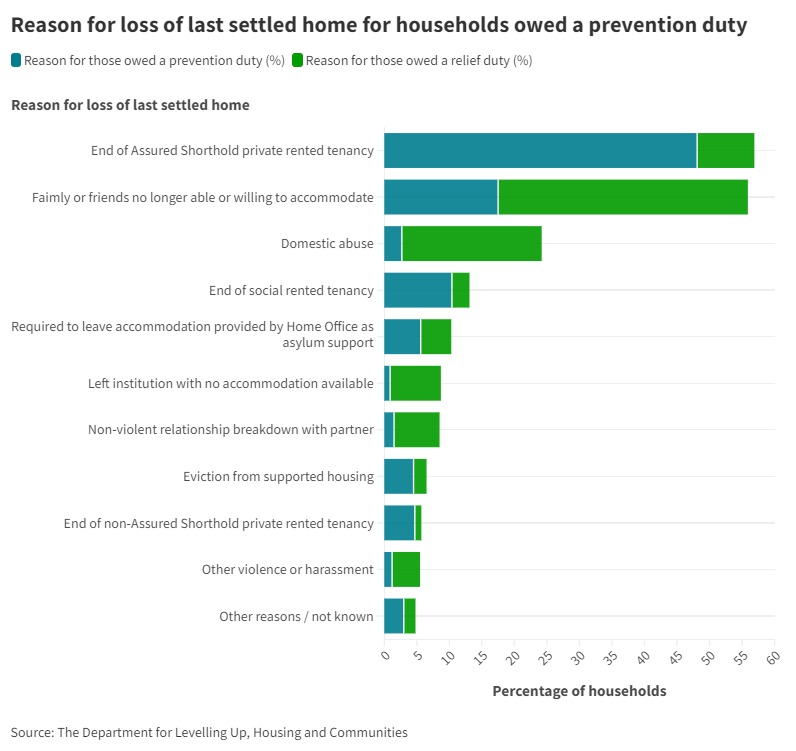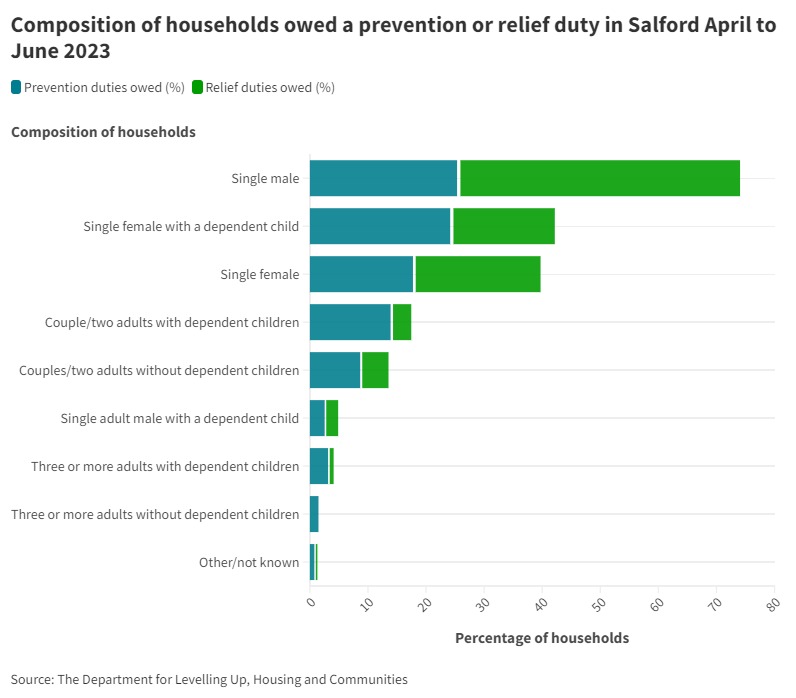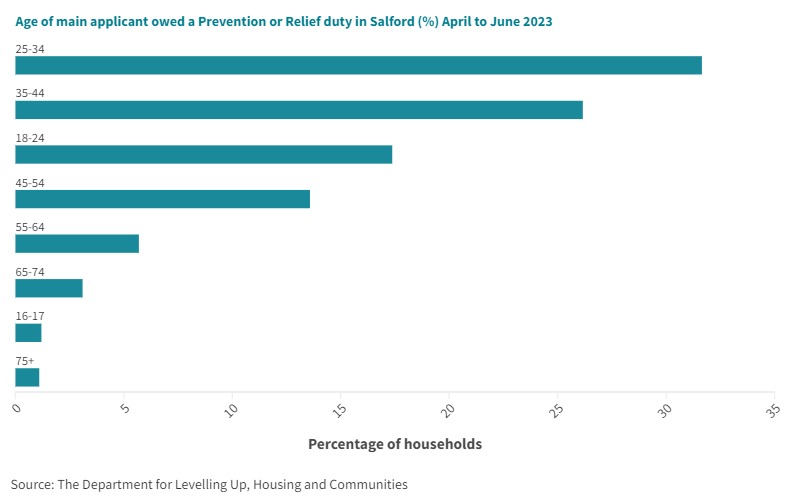People living in Salford received more homeless support from the council than any other North West local authority, according to the latest figures.
The Department for Levelling Up, Housing and Communities recorded statutory homelessness assessments and activities for the three-month period between April and June 2023 – the latest available data – for each local authority across England.
On average, Salford needed more than double the assistance of other local authorities within the North West, with nearly seven of every 1,000 households requiring support.
David Smith, chief executive of Stepping Stones homeless charity, based in Rochdale, said: “Salford borders right onto Manchester city centre so it is not surprising it has a similar homelessness rate, but it does surprise me that it has a higher rate.
“The further away from Manchester city centre you go the less prevalent and concentrated the issue is.”
Households can apply for homeless assistance from their local authority under the Homeless Reduction Act 2017. Prevention duties must be provided to households threatened with homelessness – those likely to become homeless within 56 days or have been given a section 21 eviction notice.
Relief duties are granted to households that are already homeless. Local authorities are compelled to help people find secure accommodation for at least six months.
Salford makes up one of 10 local authorities in Greater Manchester, which as a city-region had the highest rate of homelessness in the North West.
Salford Council was approached for comment, but did not reply.
Compared to the rest of England, Greater Manchester had a large problem with homelessness - with more than four per 1,000 households on average seeking support from their council compared to three per 1,000 across the country.
Smith said: "You find hotspots across the whole of the North West region, often gathered around larger towns where poverty is highest and rent generally at its lowest.”
As part of the local authorities' assessment, they must establish reasons which led to the household becoming homeless - or threatened with homelessness - before action is taken.

End of private rented Assured Shorthold Tenancy was the most common reason for households being owed a prevention duty in Salford (48%), mainly due to landlords wishing to re-let the property. This was followed by family or friends being no longer willing or able to accommodate (18%).
This reflected trends within Greater Manchester’s other authorities, with the end of private rented Assured Shorthold Tenancy accounting for 45% of households and family or friends being no longer willing or able to accommodate making up 23%.
For those owed a relief duty, family or friends being no longer willing or able to accommodate was the most common cause of homelessness (38%) followed by domestic abuse (18%).
Salford had five times more domestic abuse cases than other households in Greater Manchester on average.

Single men in England were the most likely to need homeless support, and were twice as likely to require assistance than single women.
In Salford single men followed by single mothers were owed the most prevention duties, 26% and 25% respectively, as well as relief duties, 49% and 18%.
While single men similarly dominated the amount of households needing help in Greater Manchester, single mother's were owed the most relief duties (27%).
Within Greater Manchester, single adults were more likely to apply for support when they were already homeless, whereas parents were more likely to apply when they were threatened with homelessness.

Young people were shown to be needing the most homeless assistance across England.
The largest age group owed a prevention or relief duty in Salford were 25 to 34-year-olds (37%) followed by 35 to 44-year-olds (26%) and 18 to 24-year-olds (17%), and this was similarly reflected across Greater Manchester.
Rising homelessness problems has left many local authorities struggling to deal with housing demands and some have even been pushed to bankruptcy.
The Stepping Stones charity works closely with local authorities across the North West to support vulnerable people and those at risk of homelessness by providing suitable accommodation.
Mr Smith said: “It’s staggering the amount that local authorities are spending on homelessness.
“Charities like ours are trying to do what we can to provide both temporary and permanent accommodation at the lowest possible cost to local authorities.
It is down to each local authority to work out how best to provide a housing solution for applicants, and Mr Smith revealed that levels of support offered can vary drastically.
He said: “North Western authorities are trying their hardest with very limited resources to be able to deal with what seems to be an exponentially increasing demand for their services.
“Nationally and regionally, local authorities are screaming out for additional help from the government in terms of funding because temporary accommodation bills and homeless bills are going through the roof.”
Most people threatened with homelessness in Greater Manchester had their prevention duties ended after being helped to find secure accommodation for over six months by the council.
However, in Salford most prevention duties were ended after households subsequently became homeless (45%), although this was closely followed by households who were provided with secure accommodation (44%).
Fewer households in Greater Manchester were provided with secure accommodation than England as a whole, which saw over half of prevention duties end because of this, while more became homeless, with only a quarter of people finding themselves in this position across the country.
For those who were already homeless and owed relief duties, it proved harder to find secure accommodation.
In Salford, only a quarter of households who saw their relief duties end were provided with suitable accommodation, while more than half remained homeless.
Households across Greater Manchester also struggled to access suitable accommodation, and homeless rates were 7.5% higher than the rest of England.
For those who had not secured accommodation, local authorities had to assess if a main duty would be owed.
Main duties are carried out if households are deemed as unintentionally homeless, eligible for assistance and requiring priority needs.
Over half of the 303 main duty decisions in Salford were accepted, and 68% of these were able to secure social housing.
This was reflected across Greater Manchester, however, the success rate of finding suitable housing was 10% lower than across England.
While Salford had proportionally more households needing homelessness assistance within Greater Manchester from April to June 2023, it aligned with general data trends.
Greater Manchester had higher levels of homelessness than across the country on average.
Rising homelessness rates, lack of available housing, and the cost of living are making it harder than ever for local authorities to fulfil their duties.




